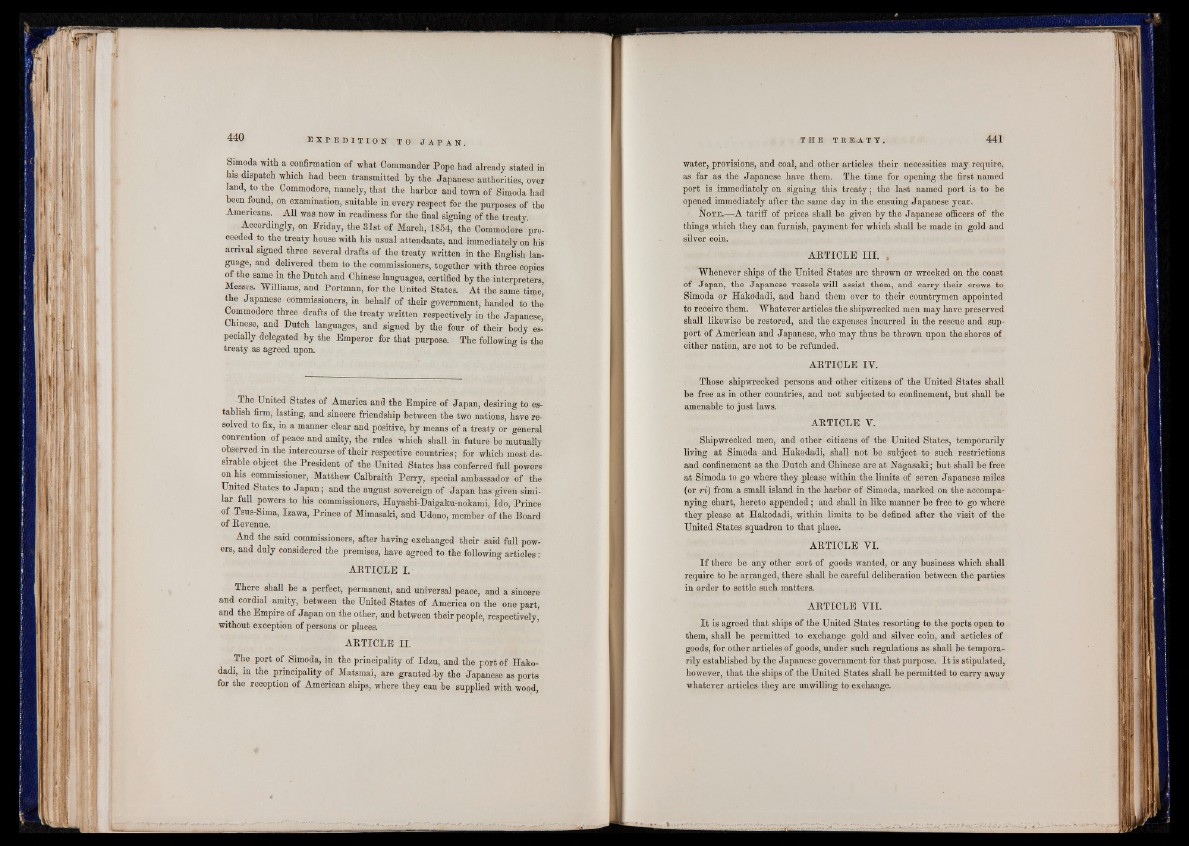
Simoda with a confirmation of what Commander Pope had already stated in
his dispatch which had been transmitted by the Japanese authorities, over
land, to the Commodore, namely, that the harbor and town of Simoda had
been found, on examination, suitable in every respect for the purposes of the
Americans. All was now in readiness for the final signing of the treaty.
Accordingly, on Friday, the 31st of March, 1854, the Commodore proceeded
to the treaty house with his usual attendants, and immediately on his
arrival signed three several drafts of the treaty written in the English language,
and delivered them to the commissioners, together with three copies
of the same in the Dutch and Chinese languages, certified by the interpreters,
Messrs. Williams, and Portman, for the United States. At the same time’
the Japanese commissioners, in behalf of their government, handed to the
Commodore three drafts of the treaty written respectively in the Japanese,
Chinese, and Dutch languages, and signed by the four of their body especially
delegated by the Emperor for that purpose. The following is the
treaty as agreed upon.
The United States of America and the Empire of Japan, desiring to establish
firm, lasting, and sincere friendship between the two nations, have resolved
to fix, in a manner clear and positive, by means of a treaty or general
convention of peace and amity, the rules which shall in future be mutually
observed in the intercourse of their respective countries; for which most desirable
object the President of the United States has conferred full powers
on his commissioner, Matthew Galbraith Perry, special ambassador of the
United States to Japan; and the august sovereign of Japan has given similar
full powers to his commissioners, Hayashi-Daigaku-nokami, Ido, Prince
of Tsus-Sima, Izawa, Prince of Mimasaki, and Udono, member of the Board
of Revenue.
And the said commissioners, after having exchanged their said full pow-
ers, and duly considered the premises, have agreed to the following articles:
ARTICLE I.
There shall be a perfect, permanent, and universal peace, and a sincere
and cordial amity, between the United States of America on the one part,
and the Empire of Japan on the other, and between their people, respectively’
without exception of persons or places.
ARTICLE II.
The port of Simoda, in the principality of Idzu, and the port of Hako-
dadi, in the principality of Matsmai, are granted-by the Japanese as ports
for the reception of American ships, where they can be supplied with wood,
water, provisions, and coal, and other articles their necessities may require,
as far as the Japanese have them. The time for opening the first named
port is immediately on signing this treaty; the last named port is to be
opened immediately after the same day in the ensuing Japanese year.
N o t e .— A tariff of prices shall be given by the Japanese officers of the
things which they can furnish, payment for which shall be made in gold and
silver coin.
ARTICLE I I I . ,
Whenever ships of the United States are thrown or wrecked on the coast
of Japan, the Japanese vessels will assist them, and carry their crews to
Simoda or Hakodadi, and hand them over to their countrymen appointed
to receive them. Whatever articles the shipwrecked men may have preserved
shall likewise be restored, and the expenses incurred in the rescue and support
of American and Japanese, who may thus be thrown upon the shores of
either nation, are not to be refunded.
ARTICLE IV.
Those shipwrecked persons and other citizens of the United States shaU
be free as in other countries, and not subjected to confinement, but shall be
amenable to just laws.
ARTICLE V.
Shipwrecked men, and other citizens of the United States, temporarily
living at Simoda and Hakodadi, shall not be subject to such restrictions
and confinement as the Dutch and Chinese are at Nagasaki; but shall be free
at Simoda to go where they please within the limits of seven Japanese miles
(or ri) from a small island in the harbor of Simoda, marked on the accompanying
chart, hereto appended; and shall in like manner be free to go where
they please at Hakodadi, within limits to be defined after the visit of the
United States squadron to that place.
ARTICLE VI.
I f there be any other sort of goods wanted, or any business which shall
require to be arranged, there shall be careful deliberation between the parties
in order to settle such matters.
ARTICLE VII.
I t is agreed that ships of the United States resorting to the ports open to
them, shall be permitted to exchange gold and silver coin, and articles of
goods, for other articles of goods, under such regulations as shall be temporarily
established by the Japanese government for that purpose. I t is stipulated,
however, that the ships of the United States shall be permitted to carry away
whatever articles they are unwilling to exchange.